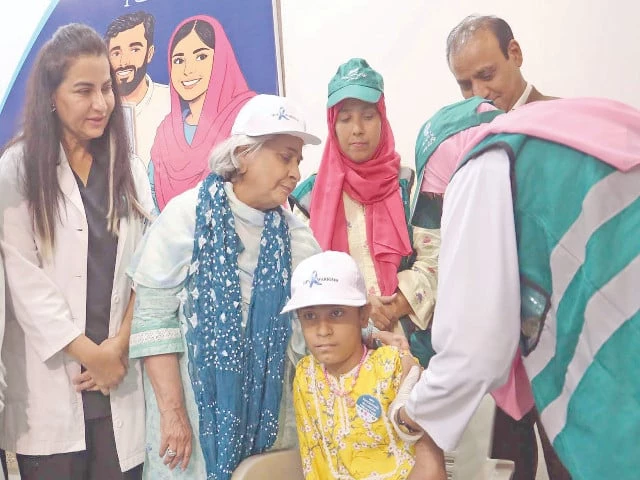The human vaccination campaign in papillomavirus across Karachi and the rest of the Sindh was extended by three days. During the 12 -day road, 59% of eligible girls were vaccinated, while the sessions will continue in schools to cover the remaining 41%. The mobile teams were also invited to continue the catch -up activities.
The human vaccination campaign of Papillomavirus (HPV) took place from September 15 to 27, the single vaccination reader set a target of 395,609 girls. Among these, 307,421 were vaccinated.
According to a letter published by the project director of the extended vaccination program (EPI) of Sindh, Dr. Raj Kumar, 59% of targeted girls received the vaccine in the first 12 days. To achieve the fixed objective, the Sindh department of health extended the September 29 campaign (today) until October 1. Special advice will be allocated to the Union’s advice where a higher number of girls are not vaccinated.
School sessions will continue in areas where coverage is less than 80% or where the teams have not yet reached. The teams and supervisors in the field were responsible for participating in catch -up activities without any additional budget. The education department will remain engaged to improve access to school.
The assistant commissioners will supervise catch -up activities at the district level. Social leaders, teachers, parents and religious scholars will be involved in awareness sessions to increase public support and trust in the vaccine. Civil society organizations will help extend community awareness. Health centers and district authorities will also keep the appropriate vaccination bottles used.
The results of the vaccine left the results to be desired, with rumors and false information hindering the targeted number fixed by government institutions. The Ministry of Health must be greeted for the efforts made to combat this propaganda. The campaign relied on pediatricians, gynecologists and front -line workers to inform communities about the prevention of HPV and cervical cancer.
Read: The blow they fear: vaccine against HPV and the battle on the rise
However, the figures affected by the Drive vaccine could not correspond to the expectations of the government. The campaign concluded, reaching 77.1% of its target. Despite the journey, nearly 89,000 girls could not be vaccinated due to the parental refusal, the absence of the house or the school and the disease.
The HPV vaccination campaign has been wrapped in controversy since its creation. Political leaders disseminate false propaganda on this subject, which has led many parents to prevent thousands of children from receiving it.
False rumors had become so powerful that high members of the government, as The Federal Minister of Health, Mustafa Kamal publicly vaccinated his daughter to dispel rumors and disinformation surrounding the vaccine against anti-service cancer, saying that the vaccine is safe and essential to protect future generations. “To counter this deceptive story, I had my own daughter, Raja Kamal, vaccinated in front of the media to show that there is nothing to fear,” he added.
It helped, but not much. Parents have criticized their doors on health workers and certain schools closed for days above false complaints that it causes infertility.
The popular leader of a right -wing religious party, Rashid Mehmood Soomro, said that the voluntary vaccine was forced to girls by the government. “In reality, our daughters have become infertile,” he told a rally in Karachi.
Find out more: The Sindh deploys the vaccine against HPV addressing technical gaps, and not social gaps
These statements echo a large part of the inaccurate accounts linked to the Drive Polio Vaccine. In the 2010s. Such an infertility propaganda had riddled the polio vaccine campaign, which led to the National Research and Development Foundation (NRDF) before publishing a declaration on false information. Pakistan is one of the last two countries in the world, alongside Afghanistan, where polio remains endemic, despite global efforts to eradicate the virus.
The conspiracy theory that vaccines produced from the West are used to slow down the Muslim population for the first time overfacked during the polio campaign, and is now attending a revival with the start of the HPV vaccinations campaign.
“Some people refused, closed their doors on us and even hid information on their daughter’s age,” the vaccine, Ambreen Zehra, told AFP while driving in an intermediate income district lower than Karachi.
Pakistan’s relationship with vaccines was tumultuous to say the least. Pakistan is currently the second largest country with the largest number of children with zero doses of vaccines in South Asia, number one being India. A study by British Medical Journal Lancet revealed that Pakistan had 419,000 children in this zero vaccine category.




